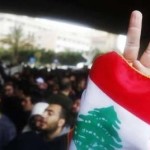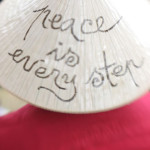“Everybody has a mission”: Dala Ghandour reflects on what brought her to SFCG
Interviewed by Audra Gustin, SFCG Communications Intern
Dala is a lawyer specialized in family status legal matters and a certified mediator, offering mediation services to the unprivileged populations in North Lebanon, Lebanese prisoners and as a family mediator for divorced couples in Beirut Sharia Courts. She aims to introduce mediation into the legal system and spread this culture of forgiveness and reconciliation in the Lebanese society.
Further, in the interest of empowering youth and women to participate in their own political process, she ran as an independent candidate for Beirut municipality elections in 2010. As she says, “I believe that politics should not be only left to politicians!”
She will be interning with the SFCG Race Project with Jeanne Isler for six weeks, ending on June 8th.
How did you come to be part of the Leaders of Democracy Fellowship program?
“I feel very lucky that I’m part of this.”
“LDF is a program that gathers 20 Arab leaders from the Arab world, as Arab activists; [it] takes us to Maxwell School at Syracuse University for a month so we learn about public administration, public policy, and of democratization and so on. Then we come and we apply what we have learned in one of the different NGOs in Washington,DC…
We are very lucky because the LDF group is very interesting and we learn from each other so much. … It’s really awakening to discover the MENA region from others’ perspectives.”

LDF Fellows Dala Ghandour, Shata Al Harazi (USIP), Emna Ben Yedder (SFCG), and Mireille Karam (POMED) at Green Parks, near to Syracuse NY.
So was your placement at SFCG your own selection or arranged?
“They arrange that for you, but it’s according to your interest. As a lawyer and mediator, I’m very interested in peacebuilding and conflict resolution. This is why I chose to be with Search for Common Ground.
Most especially I like that I’m working on the Race Project, which works with congressmen and congresswomen about racial issues. This is of interest to me as well because you have peacebuilding, but on the political level. I think they should go together.”
As a certified mediator and lawyer, what do you feel are the differences between NGO mediation efforts, like SFCG, and those used in the legal field?
“When you’re working in [the legal system], you’re working on your rights and your duties and what you should do. What I like in mediation, what I like about SFCG, is that you have another alternative; you are giving other options. I work mainly in family law, but SFCG works more on national issues, just like healing the wounds of history, of racial or religious issues. For me it’s very important because, in Lebanon, I’m also on the mission of healing the wounds of history from the Lebanese civil war. Because I do believe that we still don’t have a strong state; we still believe we are 18 communities because of the lack of unifying citizenship. I think healing the wounds of history and doing a job [like SFCG] would be a great benefit to Lebanon and all its citizens.”
As you are now working with Jeanne Isler on the SFCG Race Project, what connections do you see between racial reconciliation in the U.S. and that of Lebanon?
“I see a lot of similarities. Because you know, when there is segregation, it’s always the same. You’re always coming from the point that you are better than the other side. And just like that, you should be protected; that you shouldn’t see the other side because he’s a threat to you. We have this saying:
‘People are the enemy of what they ignore.’
And when you don’t know about the other, then you would pin any fantasy, good or bad, on this person. So just like when people or communities are trying to protect each other more and more; [confine] them to the same areas geographically, to go to the same places, to linger always with the same people then you’re putting yourself in this prison. You’re putting your mind in a prison where you don’t see the difference, when you don’t see the other because you are afraid.
In this sense, Lebanon is a lot like the U.S. I discovered that here in the U.S. you have… segregation in the mind, where you don’t see a lot of intermixed marriage. I don’t see a lot of, for example, black and white mixing; it’s coming, but still you feel some barriers. Most importantly, it’s mental barriers. Nothing in the law would say to this person, don’t go to this area, but people would put these barriers and narrow their own freedom when they have the luxury to have it all…
It is so easy to destroy and so difficult to build. And it’s even more difficult to forgive, or just to say, ‘I am going to be the stronger one and I’m going to go to this other person and listen to him, and see how we can make [peace].’ And people would see this as a weakness.
It takes time.”
Looking at the time it has taken America, which still has mental barriers decades after the legal barriers have been taken down, how does that affect your view of Lebanon’s future?
“When you work in peacebuilding and mediation, first you should be very patient because wounds take time to heal. But the more time you take in healing them, the more you prevent these conflicts coming back in the future. And second, you should be optimistic. You should believe in human beings; you should believe in their power in going beyond themselves. And if you don’t believe in this power, you can’t be in this field.”

Left to right: Dala Ghandour, Shata Al Harazi, Emna Ben Yedder and Muna Al Balus (Vital Voices) at Niagara Falls. “This says so much about the spirit we have together.”
What work that SFCG is doing have you found most exciting or inspirational and why?
“I’m really impressed. SFCG is institutionalized mediation working all over the world.”
“I like the work you do in Africa. I think it’s really good when you bring people together, especially in Burundi and like all this Track II diplomacy. I like it because it’s been thirty years, so SFCG’s quite old in this field… and at the same time you’re always innovating, bringing new things…
I think the Race Project is very important. It would be very interesting to develop it with follow-up, because these wounds are deep. I know that the Race project wants to go back to the community, see how it changed them, do sessions with them because it’s not easy to open the wound and then leave. We need to be around these people to know more about the collective trauma, and the important steps they take towards healing.”
You ran as an independent candidate for Beirut municipality elections in 2010. Why and how has this impacted you?
“It’s the best thing I’ve ever done!”
“I ran for office as an independent candidate in May 2010. I believe that , when you empower youth, when you empower women, when you empower citizens to take the issues of their society into their own hands, that makes them responsible and stops them from passively leaving it to politicians. Because if you leave it to politicians, politicians they will do anything!… We have a certain responsibility of asking ‘what are you doing? Why are you doing it?’ And you know, this is why I’m here in the LDF program.”
“[Running] isn’t about winning, it’s not about victory; it’s all about raising awareness, inspiring, speaking your mind. And there’s nothing better than that. I like this quote of Gandhi:
‘Happiness is when what you think, what you say, and what you do are in harmony.’
And this is how I felt…during my campaign.”
“I [have] met inspirational people all over the world who believe so much in their own countries and their responsibility in improving them… It tells you that you’re not here alone, even though you might think that you are sometimes..
‘Never underestimate the power of a few committed people to change the world. Indeed, it is the only thing that ever has.’ ~ Margaret Meade
I believe that human beings are here on a mission. Each person has a mission, like a life calling. Either you say yes or no to it. For me, it’s improving the sense of civic community in my country, raising awareness and learning so much from others.”










Trackbacks and Pingbacks